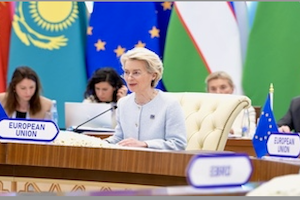The European Union announces retaliation against the U.S., imposing tariffs on U.S. goods starting April 15

U.S. President Donald Trump’s insistence on implementing aggressive tariff measures has impacted the global economy. On April 7, Ursula von der Leyen, President of the European Commission, announced that the EU will begin imposing tariffs on U.S. imported goods in two phases: the first batch starting on April 15 and the second batch starting on May 15. These retaliatory tariffs will target a range of U.S. imports in response to previous U.S. trade restrictions on European products. Earlier, von der Leyen stated that the EU remains open to tariff negotiations but is also prepared for retaliation, having previously proposed zero tariffs on industrial goods to the U.S.
Last week, the Trump administration imposed a 25% tariff on imported cars and announced on April 2 the imposition of a 10% baseline tariff on goods sold to the U.S. from more than 180 countries and regions. High reciprocal tariffs were also set for about 60 countries. The baseline tariffs went into effect at midnight Eastern Time on April 5 (12:00 PM Taipei time), while the reciprocal tariffs will be imposed at midnight Eastern Time on April 9 (12:00 PM Taipei time).
A spokesperson for the European Commission stated that the tariffs will cover key U.S. export industries, including agricultural products, steel and aluminum products, and machinery, with tariffs reaching up to 25%. The spokesperson emphasized, "Our actions are a legitimate response to unfair trade measures, in line with World Trade Organization (WTO) rules."
The U.S. had previously imposed additional tariffs on several European products, citing protection of domestic industries and national security, which sparked strong dissatisfaction within the EU. The EU’s trade commissioner pointed out that the retaliatory measures are aimed at defending European businesses and workers' interests, urging the U.S. to restore constructive trade dialogue as soon as possible.
The escalation of tariffs has raised concerns in the European business community, with many companies worried about rising costs and disruptions in the supply chain. A German exporter said, "We hope both sides can return to the negotiating table to prevent the trade war from escalating."
At the same time, the EU stated that if the U.S. is willing to remove the relevant trade restrictions, the EU would adjust its measures accordingly.
- 66 reads
Human Rights
Fostering a More Humane World: The 28th Eurasian Economic Summi

Conscience, Hope, and Action: Keys to Global Peace and Sustainability

Ringing FOWPAL’s Peace Bell for the World:Nobel Peace Prize Laureates’ Visions and Actions

Protecting the World’s Cultural Diversity for a Sustainable Future

Puppet Show I International Friendship Day 2020

